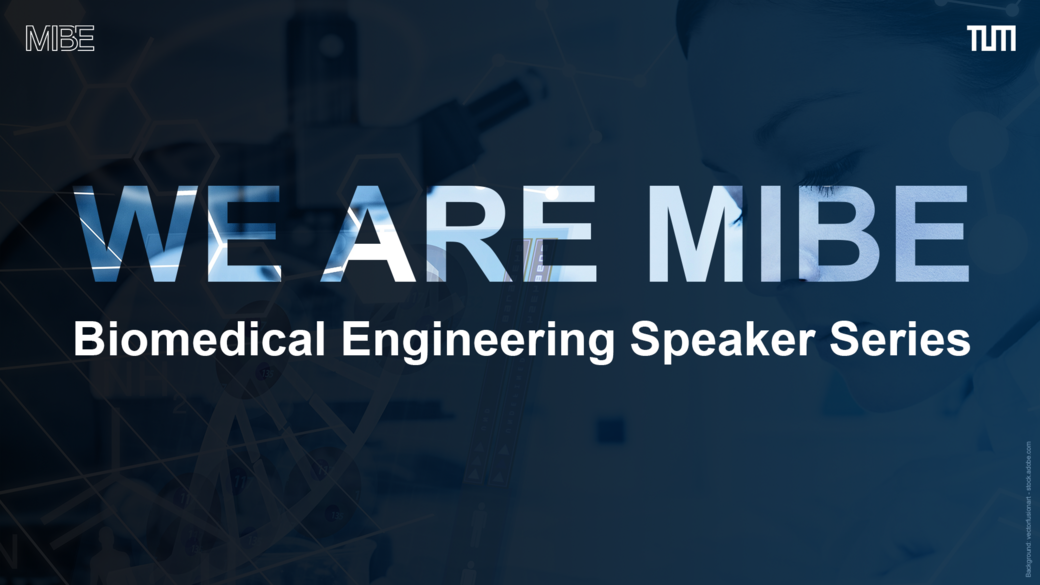At each event, two Principal Investigators (PIs) of MIBE will provide exciting insights into their research. After the talks, which take around 25 minutes each, there is plenty of time for networking.
Prof. Dr. Vasilis Ntziachristos: Advances in optical and optoacoustic imaging and sensing
Prof. Dr. Franz Pfeiffer: X-ray darkfield imaging - from basic research to first medical applications
Date and Time: Wednesday, February 28th, 2024, 4:15 pm – around 5:15 pm, afterwards networking
Place: MIBE lecture hall (room E.126), Boltzmannstraße 11, 85748 Garching and Zoom
Prof. Ntziachristos’ research focuses on the development of novel optical and optoacoustic imaging, sensing and computational methods for accelerating discovery and advancing well-being by early detection of disease leading to improving prevention, diagnostics and administering more efficient treatment. His activities cover the entire spectrum from theoretical and methodological developments to basic research, clinical translation and entrepreneurship.
Examining diabetes with a skin scanner and AI - Press release (2023)
Deep insights in skin imaging - Press release (2021)
High-resolution 3D view inside tumors - Press release (2020)
Image: Stephan Rumpf
Professor Pfeiffer conducts research on biomedical X-ray physics. His focus is on new imaging methods for improved early diagnosis and detailed studies of illnesses such as cancer, lung diseases and osteoporosis. His scientific work extends from fundamentally oriented research with brilliant X-rays in large international research centers to applied research on new concepts in radiology. Professor Pfeiffers most important contribution to science is the invention of a novel method for X-ray phase-contrast imaging and its translation to pre-clinical and clinical applications, with a particularly high diagnostic benefit for lung diseases.
Prof. Franz Pfeiffer nominated for the A. F. Harvey Engineering Research Prize 2023
New X-ray technology can improve Covid-19 diagnosis - Press release (2022)
New technology for clinical CT scans - Press release (2022)
Image: Andreas Heddergott / TUM
Advances in optical and optoacoustic imaging and sensing
Biological discovery is a driving force of biomedical progress. With rapidly advancing technology to collect and analyze information from cells and tissues, we generate biomedical knowledge at rates never before attainable to science. Nevertheless, conversion of this knowledge to patient benefits remains a slow process. To accelerate the process of reaching solutions for healthcare, it would be important to complement this culture of discovery with a culture of problem-solving in healthcare. The talk focuses on recent progress with optical and optoacoustic technologies, as well as computational methods, which open new paths for solutions in biology and medicine. Particular attention is given on the use of these technologies for early detection and monitoring of disease evolution. The talk further shows new classes of imaging systems and sensors for assessing biochemical and pathophysiological parameters of systemic diseases, complement knowledge from –omic analytics and drive integrated solutions for improving healthcare.
X-ray darkfield imaging - from basic research to first medical applications
The basic physics of X-ray image formation in medical imaging has remained essentially unchanged since the discovery of X-rays by Roentgen over one hundred years ago. The approach in medical imaging relies on X-ray attenuation as the sole source of contrast and uses the particle picture to describe and interpret image formation. This approach ignores another potentially more useful source of contrast, the wave-optic interaction of X-rays with matter. Similar to light microscopy, advanced imaging concepts such as phase contrast and/or dark-field imaging can provide tremendous improvements in image quality and sensitivity.
In this talk, Prof. Pfeiffer will present his research group's recent results from the world's first application of dark-field radiography in patients, for which they developed, built, and installed a first dark-field chest X-ray system at the TUM University Hospital Klinikum rechts der Isar. With this system, they were able to demonstrate that dark-field imaging can significantly improve the diagnosis of lung diseases such as chronic obstructive pulmonary disease (COPD), severe acute respiratory syndrome coronavirus 2 (SARS-CoV-2), and pneumothorax.
These findings are also important from a societal perspective, as respiratory diseases are a major cause of chronic illness and mortality worldwide. While modern medical imaging techniques now provide detailed diagnostic information, there is still a lack of a low-dose, rapid and cost-effective option for early detection and/or follow-up.
Further Information
Livestream
There will be a live-stream for this event via zoom: https://tum-conf.zoom.us/j/612 2888 8412 Passcode: waMIBE
Recognition Qualification Program for Doctoral Candidates
If you're doing your doctorate within the field of biomedical engineering, regular participation in the speaker series can be counted towards subject-specific qualification in DocGS.
Registration form for doctoral candidates
Further Talks in this Series in Winter Term 2023/24
This is the last event in the winter term 2023/24.
The next We are MIBE talks will be taking place in the summer term 2024 on the following Wednesdays at 4:15 pm:
- April 17th, 2024 Prof. Susanne Kossatz & Prof. Wolfgang Weber
- June 5th, 2024 Prof. Jürgen Ruland & Prof. Daniela Pfeiffer
- July 10th, 2024 Prof. Bernhard Hemmer & Prof. Werner Hemmert


